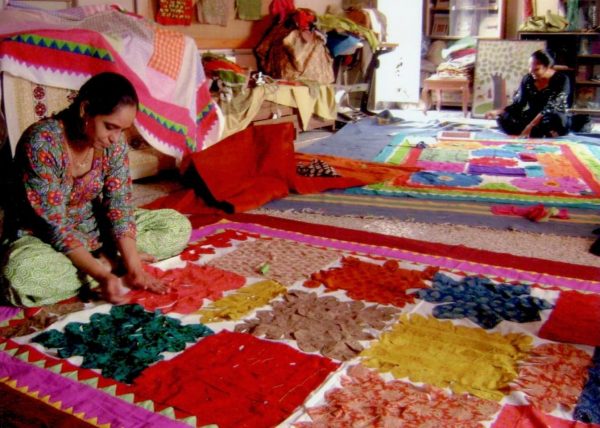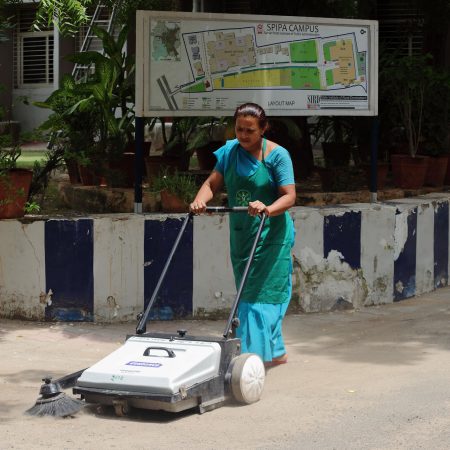Around the world 61% of those employed are working in the informal economy – and a 2018 report by the International Labour Organization says a transition to the formal economy is a condition to realise decent work for all.
Efforts are being made in that direction: for instance, in India, the Self-Employed Women’s Association (SEWA) has been helping women in the informal economy set up co-operatives since 1972. Around 81% of all those employed in India are in informal employment.
Founded by activist Elaben Bhatt, SEWA is a nationally registered trade union demanding rights for women workers in the informal economy. A lawyer by training, Ms Bhatt realised that while the union provided a vital service, it was also crucial to bring fair and decent employment to women workers, who needed a daily wage to survive. Co-operatives were seen as a sustainable model.
In 1974, under SEWa’s guidance, women headloaders set up a co-operative bank, after having been denied bank loans to develop their business. Three years later, the first trade-based co-operative of quilt-makers was formed.
In 1992 the Gujarat State Women’s SEWA Cooperative Federation was registered as a state-level apex body to provide services and strengthen its primary co-operatives members.

Nowadays the federation includes 106 co-ops across six sectors, with an annual turnover of INR 3bn (£35.75m), all run by women. It focuses on capacity building, training and marketing. Some of these enterprises are worker co-operatives; others are producer and service co-operatives. Many women members have limited formal education and skills, and come from poor communities. Co-ops are linked with the SEWA Cooperative Federation for purposes of incubation until they can become self-reliant.
Jaya Vaghela, who has been involved in SEWA for 26 years, is now deputy managing director of SEWA Federation. After graduating she started looking for jobs. Her father, who worked in a cotton mill, recommended she enquired at SEWA, whose head office was near the cotton workers’ union.
She went to SEWA to ask for a job and met an administrator who asked her to come for an interview the next day. After securing a job with them, she started working in the dairy co-operative sector. Around 30 co-operatives were members at the time, and she did the accounting for 10 of these. She thinks the federation continues to play an important role in the empowerment of self-employed women. It enables women to become decision-makers, owners and users of their own co-operatives, she says. The Federation also facilitates access to new markets and technology for its member co-ops.
Related: We speak to Simel Esim of the ILO about co-ops and the future of work
SEWA Federation helps women organise themselves, register their co-ops, develop co-operative by-laws and business plans and become sustainable. With its network of co-ops across different sectors, it can refer co-ops to services offered by other member co-ops, according to their needs. An individual worker is often a member of various co-operatives that not only support her livelihood activities but also provide services like insurance, healthcare and financial services.
One of the biggest barriers is to accessing work via tender processes, which often requires having substantial capital. As a result, smaller co-ops cannot always participate.

New technology brings challenges as well and while women are willing to try it, implementation can be an issue.
“We also find that technology itself is expensive and is optimised for men,” said Salonie Hiriyur, a senior associate with SEWA Federation.
Another hurdle is being at a competitive disadvantage. All SEWA co-ops pay fair wages unlike many of their competitors.
“We believe our sisters must earn at least a minimum wage,” added Ms Hiriyur.
What are their plans for the future? “In 10 years’ time we want to be a role model, locally, nationally and internationally. Our vision is full employment and self-reliance of women, we want women to take ownership,” said Ms Vaghela.
The co-op is exploring opportunities in organic agriculture, the caring economy as well as urban services such as domestic work and beauty services.
“We will continue to break the male dominated approach found in different sectors,” said Ms Vaghela, who has been to Tanzania and Ethiopia to give training to co-ops there.
SEWA’s model attracted international attention and praise from the International Labour Organization, which featured it as a case study in its reports.
Seeing women collectivise has also brought a shift in mindset. Ms Hiriyur met a worker who told her about a colleague waste picker who had faced initial opposition from her husband. He initially opposed her joining the co-op but changed his mind after seeing her work together with other women, supporting each other.
Related: Women co-operators share their stories for International Women’s Day
“Over the years he became very proud of her association. She now works as a leader in her community – helping other women open bank accounts, form their own collectives and access government schemes. She also runs a literacy class in her home, through SEWA Academy,” said Ms Hiriyur.
Ms Vaghela added: “Communities change becoming more acceptant. Perhaps we are not witnessing a complete break with the social norms but at least a tiny crack in them.
“Women were economically empowered. They became board members and earned respect in their communities because they were managing big co-ops. They also became decision makers in their households. It enabled them to educate their children and drive a shift in literacy. One of our sisters is a street cleaner; her son is now a computer engineer. There are many stories like this one,” she said.
SEWA also works to connect its members to the wider co-operative movement. The federation includes 65 dairy co-ops, which are also part of dairy giant AMUL, also a co-operative federation. AMUL’s strategy enables all dairy co-ops to become members. Therefore, SEWA decided to link its dairy co-ops to AMUL’s network, and widen their market.
The federation is keen to work with other organisations to enable members to access new technology and provide an alternative to those working in the gig economy. It is planning to develop a platform co-op to provide beauty services, which will allow users to request a worker-owner to come to their home to provide a range of services, including makeup, threading, waxing, haircuts or massages. The project is a partnership with the Platform Co-op Development Kit.
As a social enterprise, the federation sometimes needs support and they are looking to partner up with other organisations.
“We are keen to bring in technological innovation to our co-ops, since these tools have often been denied to women in the informal economy, and are open to any kind of collaboration on this,” said Ms Hiriyur.